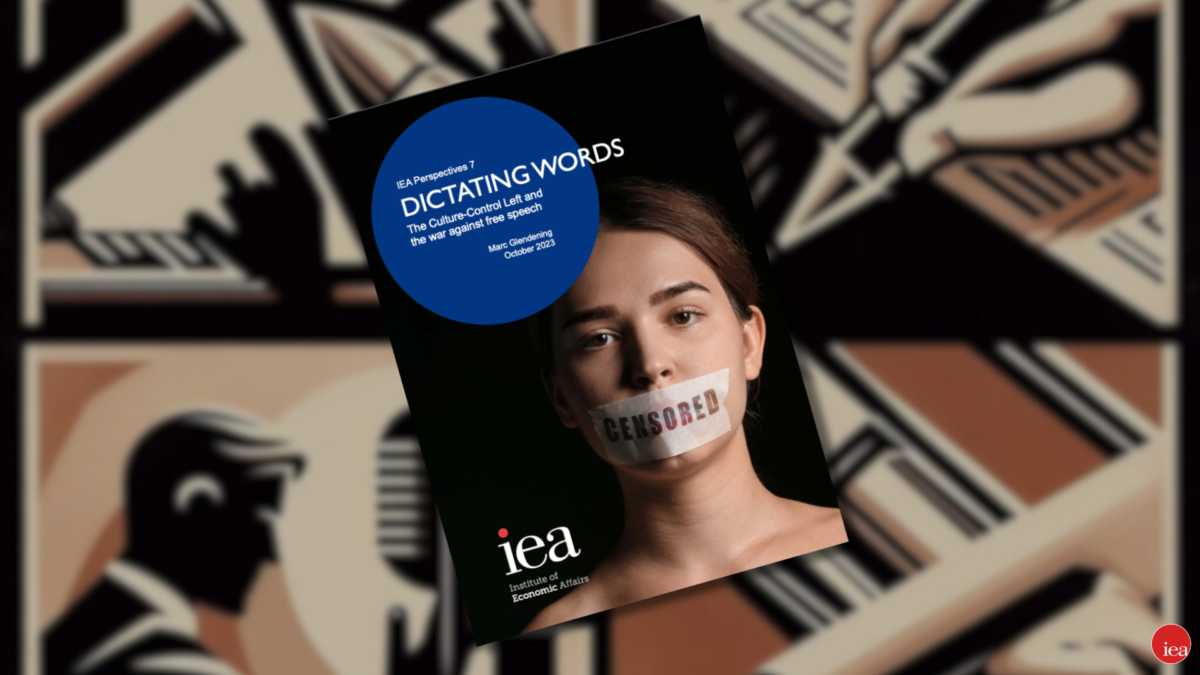Hate speech laws threaten free speech, says new IEA paper
SUGGESTED

IEA research featured in The Times

IEA research featured in The Telegraph

- Censorship advocates claim that certain viewpoints exercise coercive power — akin to an act of violence — and, therefore, must be silenced.
- This view has influenced public sector bureaucracies, big business, and politicians, including some on the Conservative side.
- It leads to support for ‘hate speech’ laws and the expanded definition of ‘harm’, which has the effect of criminalising peaceful and political expression.
- A new concept of free speech, focused on the intrinsic right of all individuals to express their opinions, regardless of their background or views, is necessary to overcome rising censorship demands.
Hate speech laws are stifling free and open debate in the UK, according to a new report from the free market think tank the Institute of Economic Affairs.
Hate crime investigations have grown in recent times. This year, a case was opened against a pensioner for putting up stickers that said ‘keep males out of women-only spaces’. Feminist Marion Miller was charged under Section 127 of the Communications Act 2003 for an allegedly transphobic tweet. Christian preachers in Birmingham have been arrested and charged for preaching in public, often based on their critical remarks about homosexuality or Islam. There have been approximately 120,000 non-crime hate incidents entered on police databases.
Report author and Head of Cultural Affairs at the IEA, Marc Glendening, attributes the growth in censorious incidents to the emergence of the ‘Culture Control Left,’ who he says have successfully weaponised concepts like ‘hate speech’ and ‘harm’ to push legislation that silences their political opponents. “Being accused of hate speech is the contemporary equivalent of being charged with blasphemy or seditious libel,” Glendening writes.
The paper says that hate speech laws are enforced in a politically partial and inconsistent manner, with police refusing to seek prosecutions for analogous cases when they are directed against white people. Police, for example, refused to pursue a case against Bahar Mustafa, the welfare and diversity officer of Goldsmiths University’s Students’ Union, who posted the phrase ‘KillAllWhiteMen’.
This censorious phenomenon is driven by the view that speech must be controlled to prevent alleged “harm” against certain marginalised groups. Labour MP Nadia Whittome claims that debate is not an “innocuous, neutral act” and that the very act of debate “is an effective rollback of assumed equality and a foot in the door for doubt and hatred”.
Glendening warns that censorship of some views based on the alleged harm is incompatible with liberal democracy. This is because it prevents debate on important and contested issues, like the role of religion or trans, which is essential for functional politics. “Britain’s liberal political culture presently faces a threat greater than any it has encountered since our country emerged as a representative democracy in the early 20th century,” he says.
The solution, the paper concludes, is to restate the case for each individual’s inherent right to think and peacefully express themselves. Glendening stresses “the unique importance of independent thought and individual agency. ”
The paper was first presented last week before publication to the Karl Popper Society, a private group of University of Oxford academics and graduate students.
Marc Glendening, Head of Cultural Affairs at the Institute of Economic Affairs and the report’s author, said:
“British democracy faces an existential threat from those seeking to silence debate. This is the result of the emergence of a ‘culture control left’ ideology that sees state regulation of language as the principal way to enforce greater social equality. This necessarily involves violating the speech rights of individuals who wish to express views considered transgressive. Defenders of political pluralism now need to wage a counterattack based upon a foundational, natural rights-based defence of free speech.”
Dr Julius Grower, co-convenor of the Karl Popper Society and Associate Professor of Law at the University of Oxford, said:
“A gem of a paper, Dictating Words provides its readers not just with a deep understanding of what has hitherto been an opaque (and yet highly impactful) political phenomenon: what its author calls the ‘Culture-Control Left’, but – crucially – both the terminology and a guide back to the underlying philosophical principles which those who believe in the primacy of individual rights and freedoms will require to challenge it.
“As it so lucidly explains, British society has in several respects strayed far from the classical liberal civil and political culture upon which our civilisation (and our prosperity) has traditionally rested. In particular, there have been disturbing and potentially still-growing moves to limit peoples’ freedom of speech in the name of achieving highly contentious and plainly contestable political outcomes. It is only by engaging with the sort of deep-minded and principled reflections that are presented in this paper that true liberals of all stripes can begin the process of pushing back against such change.”
ENDS
Notes to Editors
Contact: media@iea.org.uk / 07763 365520
Read a copy of Dictating Words: The Culture-Control Left and the war against free speech, here: https://iea.org.uk/wp-content/uploads/2023/10/Perspectives_7_Dictating-words_web.pdf
The mission of the Institute of Economic Affairs is to improve understanding of the fundamental institutions of a free society by analysing and expounding the role of markets in solving economic and social problems. The IEA is a registered educational charity and independent of all political parties.



